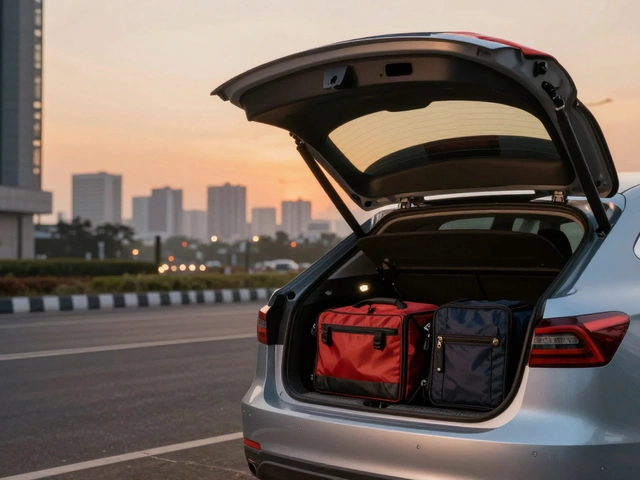Dreaming of a refreshing weekend getaway? Before you start packing, it's essential to consider how much you should spend. With the right planning, you can enjoy a memorable escape without emptying your wallet.
The cost of a weekend trip varies depending on several factors such as destination, transport, accommodation, and extras. Whether you're aiming for a spontaneous road trip or a more laid-back retreat, balancing these costs can make your journey both enjoyable and affordable.
In this article, we'll guide you through understanding what goes into the cost of a weekend escape and share some handy tips to keep your expenses in check. From unexpected fees to savvy saving strategies, arming yourself with knowledge can make all the difference. Let's unlock the secrets to smart and cost-effective weekend travels.
Understanding Basic Costs
When venturing off for a weekend getaway, understanding the basic costs involved is key to planning a budget that won't leave you gasping for breath upon your return. A weekend escape may seem like just a quick retreat, but overlooking certain costs can lead to unexpected financial stress. Let's unravel these costs layer by layer, ensuring you are well-prepared to enjoy your mini-vacation. First and foremost, consider the destination itself. Opting for a place that's a little closer to home can save a significant amount in both time and money. For instance, instead of flying to a neighboring city, you might choose a destination that's just a scenic drive away. Emphasizing travel via car can cut your transportation costs, something that always sneaks up when flying is involved.
Accommodation is another key factor. Whether you choose to stay in a cozy bed-and-breakfast, a rustic cabin, or a standard hotel, lodging can take a big bite out of your budget. Prices can vary drastically depending on location and the level of luxury you seek. Interestingly, the rise of rental services like Airbnb has expanded options and competitiveness in prices. A good balance between comfort and cost-effectiveness is what you're aiming for here. Always read reviews to ensure you're putting your money into a place that offers value for its price. Beyond the basics of transportation and lodging, don't forget to allocate a portion of your budget to dining and leisure activities. A weekend getaway is as much about the experiences as it is about the relaxation. Many travelers report that meals and unexpected outings often end up being larger expenses than initially planned. You can't enjoy the beauty of a place without indulging in local cuisine or enriching your trip with activities, so factor this in prudently.
"Traveling – it leaves you speechless, then turns you into a storyteller." – Ibn Battuta.
It’s easy to forget the tiny expenses that accumulate rapidly, like tipping, parking fees, or event tickets. These seemingly negligible costs can snowball before you realize. By itemizing these potential expenditures, you can plan a more accurate budget, letting you enjoy your trip comfortably. Here’s a pro tip: always have an emergency fund within your getaway budget. Set around 10-15% of your total budget aside as a buffer against unexpected bills, be it an impromptu shopping spree or an enticing excursion opportunity. This way, you maintain financial balance and peace of mind throughout your retreat. Lastly, remember to take advantage of travel deals or coupon codes, which can significantly cut costs. Whether it’s through early bird discounts on accommodation or travel loyalty points that accumulate over time, every saving helps.

Transportation and Lodging
When planning a weekend getaway, the two primary expenses you'll likely face are transportation and lodging. Both play crucial roles in shaping your trip, and they're areas where savvy planning can make a huge difference. Let's dive into how you can manage these costs effectively to ensure you stick to your travel budget. Considering the variety of options available, it's easier than ever to tailor your travel plans to meet both your desires and financial constraints. So, where do you begin? Start by evaluating your transportation options, which often dictate the bulk of your expenses.
Depending on your destination, you might choose to fly, drive, take a train, or even a bus. Air travel can be expensive, but with careful planning and a bit of patience, scoring a great deal isn't out of reach. Did you know that booking flights on Tuesdays has been shown to yield better prices? Some studies even suggest purchasing tickets six weeks in advance can save you up to 20%. Driving remains a favorite choice for many, offering flexibility and the ability to explore along the way. Rental cars might be an option, but don't forget to account for insurance, fuel, and possible drop-off fees. Train travel, while not as common in some parts of the world, provides a relaxing and scenic experience, especially in regions with extensive rail networks.
Lodging, the next big-ticket item, comes with its array of possibilities. Whether you're exploring cozy bed-and-breakfasts, swanky hotels, or the burgeoning trend of vacation rentals, each option carries distinct costs and benefits. Airbnb and other rental platforms have revolutionized how we think about accommodation, often providing home-like settings at competitive prices. If you're open to sharing spaces, house-sharing sites can offer fantastic savings. Many travelers, particularly younger ones, might opt for hostels, which have transformed from backpacker basics to trendy, atmospheric spots with communal amenities.
For the budget-conscious, don't overlook loyalty programs and credit card perks. Many credit cards offer points for travel-related expenses, which can eventually translate into significant savings on flights and hotels. And speaking of hotels, booking directly with them might not only offer the best rate but can also unlock exclusive offers or perks like free breakfasts or room upgrades. In fact, a survey by Skyscanner revealed that 55% of travelers still frequently use hotel websites when looking for accommodations. Lastly, leveraging seasonal trends and timing your trip during off-peak periods can stretch your dollar further, granting you access to more luxurious options for less. Don't forget to consider package deals that bundle travel and lodging, as these can occasionally provide the best bang for your buck.

Dining and Activities
When planning a weekend getaway, dining and activities often represent the heart of your travel experience. While these costs can vary widely depending on your destination and personal preferences, being strategic about choices can help you stay within your travel budget. Dining out at local hotspots offers a taste of culture and flavor unique to your getaway spot. Consider seeking out street food vendors and local markets which not only provide authentic tastes but also keep expenses down. Researching eateries in advance can uncover hidden gems that offer quality meals without steep prices.
Exploring the local scene doesn't always have to involve costly activities. Many destinations offer free or low-cost attractions such as parks, museums on special days, or community events that reveal the area’s charm without denting your budget. Opting for nature-based activities like hiking or beachcombing can be both invigorating and economical, providing rich experiences against the backdrop of stunning landscapes. Weekend getaways become more rewarding when activities aren't solely reliant on high-priced tickets or extravagant experiences.
Bold travelers might appreciate engaging in group tours or classes offered by locals, often offering not just entertainment but insight into regional customs and art forms. Checking local deal websites before your trip can yield surprising bargains. Also, don't shy away from asking your hosts or locals for recommendations; this authentic advice can steer you towards affordable yet enriching adventures. There’s no denying that savvy planning opens the door to enjoying vibrant experiences without exceeding your planned travel budget.
Travel expert Jane Anderson once said, "The best journeys answer questions that in the beginning, you didn’t even think to ask." Her words resonate with many who discover that the simple, genuine moments often deliver the greatest joy during travel.
For those who enjoy keeping a record, tracking daily expenses during your trip can be a useful way to maintain financial awareness. Apps designed for travel budgeting can help monitor where and how much you're spending on activities and dining. By being aware of your expenditure, you retain control over your financial resources, ensuring that your memories are cherished souvenirs rather than unexpected credit card bills.
Understanding the foundational costs of dining and activities, along with employing effective budgeting strategies, not only helps to save money but also enriches the trip itself. With an open mind and a little creativity, it’s possible to craft an unforgettable weekend getaway packed with flavorful meals and thrilling activities that don't break the bank. Remember, the essence of travel lies in discovery, and oftentimes, the most delightful experiences come when you least expect them, especially when you venture beyond the beaten path.

Tips for Saving Money
Embarking on a weekend getaway doesn't have to come at a high cost. With some smart strategies, you can enjoy an escape that's not only affordable but also packed with value. First, consider timing, as it's crucial in making the most of your budget. Avoid peak travel periods and school holidays, as prices tend to skyrocket during these times, making a hefty dent in your travel funds. Instead, opt for off-peak times or book mid-week stays if possible. You'll often find significant savings in both flights and accommodations just by choosing the right dates.
Another solid approach to keep costs down is by embracing flexibility. Being open to various destinations and last-minute deals can pay off significantly. Websites like Skyscanner or Kayak offer features that show the cheapest weekends to fly and can help you snag a bargain. If you aren’t picky about your destination, these tools can lead you to discover hidden gems at a fraction of the regular price. Pairing this with loyalty programs or credit card rewards can help you earn points on your travel, which often translate to discounts or free amenities.
Opting for alternative accommodation such as hostels, Airbnb, or a home exchange can also cut costs. Not only are these options generally cheaper than hotels, but they also provide unique experiences. Booking a place with a kitchen allows you to cook some meals, which can significantly reduce dining expenses during your trip. Restaurants can eat up a big chunk of your budget, so researching affordable and highly-rated local eateries is worth the effort. A quick look at reviews on platforms like TripAdvisor or Yelp can reveal delicious yet budget-friendly culinary options.
Transportation can also be a significant expense on a short trip, so it's wise to consider options like carpooling or public transit. Ridesharing apps such as Uber Pool or Lyft Line offer shared rides that can save money compared to private options. Renting a vehicle might be tempting, but it comes with added costs for parking, insurance, and fuel. Meanwhile, many cities offer tourists temporary transit passes that provide unlimited rides at a set price, which can be both convenient and cost-effective.
When planning activities, look for free or discounted attractions and prioritize outdoor adventures like hiking or visiting public beaches. Museums often have 'pay what you wish' days or specific hours when entry is free. Checking out local events or festivals can also provide entertainment and cultural insights without breaking the bank. Oftentimes, tourist information centers have guides or discount booklets, which can help reduce costs for popular attractions.
"Travel doesn’t have to be expensive. Embrace the unknown and be guided by spontaneity; let the savings follow," advises seasoned traveler and author Nomadic Matt.
Finally, remember to review your travel insurance policy. While this might seem like an unnecessary expense, it can save you a considerable amount in case of emergencies or cancellations. Some credit cards offer trip protection, so checking your benefits can save you from purchasing an additional policy. A well-planned budget and thoughtful preparation can make affordable trips more accessible and enjoyable, allowing you to focus on creating memories rather than counting pennies.









